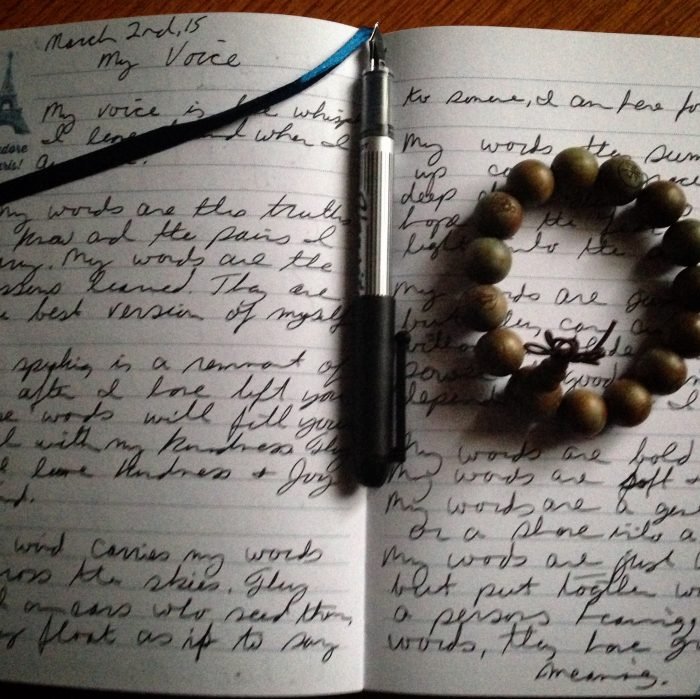Writing: may this be of benefit.
Writing has helped me through numerous events in my life.
Growing up through a tough home life, I wrote; after losing a long-time job and ending up on unemployment, I wrote; after a tempestuous divorce, I wrote.
Each time, writing allowed me to get it out—how I felt in each occurrence. It allowed me to process what was happening on the page.
I sat and wrote it all out. Sometimes, I was in tears. Sometimes, there was laughter.
But no matter what, writing soothed me with whatever I was dealing with in life.
Here are six items that may be of benefit to you, your writing, and processing what is going on in your life:
1. Writing Inspiration
Writing inspiration can come from so many different places. It can come from talking with a friend, listening at a coffee shop, hearing spoken word poetry, or reading a billboard you drive by. But, no matter what, writing can be a cathartic act for you.
Before I started writing, I kept hearing voices in my head. I would see people out and imagine their whole life playing out in my mind. I would imagine what they would say at dinner together or in the car alone.
I brought those thoughts into my stories. I would fill in the blanks with my imagination. The voices then took over, and I built up characters. Soon a storyline would appear before me.
Once written down, the voices stopped—at least until the next person or couple appeared, and my mind wandered again. These inspirations then turned into short stories for me.
2. Resolutions
Freewriting allows conversations I hear to play out on my page. Sometimes they’re happy conversations, sometimes they’re sad ones, but writing allows me to process all the emotions either way.
Hearing others sometimes sets off something within us. This something needs to be processed into something concrete, which allows you to write out how you feel about the situation.
If you’re having difficulty deciding something to write in a short story, you can try to see how your characters would deal with the issue at hand. You might realize, through your words, your solution.
In allowing your subconscious time to write without censorship, you might realize you already have your answer to the problem.
3. Journal Writing
Journal writing helps sort out feelings. If you are trying to figure out how you feel about some situation in your life, I suggest bullet points in your journal.
Write for a set time and dump every thought, feeling, and emotion down on the page. Perhaps it is about something you did not like, someone you met and did not care for, your beliefs about something.
For me, whatever it is, I just do it until my head is empty. It frees up space in my brain to focus on the main points I need to deal with in my life and be centered, present, and ready.
Usually, after this type of writing, I feel a change comes. It could be a new goal; it could be for me to join a group; it could be writing a piece on something and submitting it to a new platform.
This writing allows you to focus on what you really want to do—without all the noise in your head.
4. Writing and Sanity
In the book The Artist’s Way, by Julia Cameron, she suggests writing morning pages daily.
But morning writing for you may not work for you. Perhaps your mind is on the fact that dishes need to be put up, trash needs to go out, you need to cook breakfast, and the list goes on.
But if we take her idea of morning pages and we move them to whatever time we want to write our pages, I believe the concept of just writing it out without stopping, for a set time, allows our minds to be free.
To just write without judgement, without edits, without our minds interfering in our work. She calls this “Stream of Consciousness Writing.”
Try it and free yourself of your writing rules! Just write.
Great ideas come when we open ourselves and let our thoughts flow.
5. Written Words
Writing words down matters. Writing allows us to remain on this Earth once we are gone. The words we write matter, even if it is just to our loved ones.
Writing helps put emotions into words. It conveys what we thought, felt, and deal with. It shows the world that we were here. We wrote. We felt. We spent time capturing our worlds in words—for others.
Words can help you move through grief, help you figure out solutions to what is bothering you, and allows you to remain sane.
Writing can do so much for you. It can open your heart so you can share your struggles in life with another human. If you struggle with mental health issues, writing about it and sharing it is scary.
But when you get feedback and recognize you are not alone, nothing compares to that—to knowing the words in your heart are being heard.
Written word is a gift that you can use to help others heal. They are a benefit to all who write and read them.
Writing allows your head to stay on straight. Words give you the power to have an open heart to be of benefit to someone else who needs to hear them.
6. Hope
Writing is so much more than words; it is ideas that come to life on the page. It is giving someone hope.
It is saying: you are not alone in your struggles. It is writing, editing, and revising, but it also a process of emotions.
Words can help you in ways you never thought could be possible.
In times of grief, write; in times of hope, write. In times, in times, in times. Write, write, write!
Putting the words down allows us to see our feelings come alive—right before our eyes. It puts our emotions on the page so that we can deal with what life throws at us. Writing is indeed cathartic.
Write down what you see, hear, and feel. Hope is just a word but carries such a large meaning.
Imagine what you can do with your words—and do it!
Writing has many purposes. To process pain is one of the reasons I write. I allow it to flow out onto the page so I can sit with it—process whatever is going on.
Being vulnerable enough to share your words can be terrifying. When my first editor said to fix almost my whole article, I was crushed. I am brave enough to admit it. (I may have even cried a bit and thought this “writing and sharing” thing was not for me.) And it may not be for you—until it is.
At some point, most of us want to share, to be of benefit to others, to say, “I went through this; you are not alone.”
Sharing your heart takes beaucoup courage. Hitting send to any on or offline publication is scary. Finding the right place to send our story to is key to success.
We would not send a poem to a publication that only takes short stories. Take the time to research places before submitting. When we write, it is for the reader to read. Even if we just share it with a loved one.
Taking what we poured from our heart onto the page and sending it to someone to evaluate it—because that is what they are doing—is frightening. My finger has lingered on the submit button for more minutes than I thought possible.
We think we have a good article; we think we nailed it; we hit send. After a period, we might get the “no, thank you, your piece is not right for our publication.”
Or we might get: “thank you for submitting; we would love to publish you.”
Either way, I encourage you to hit submit today!







Read 10 comments and reply